Dec 23, 2019
TSN.ca's 2019 in Review: NCAA
As we count down to 2020, TSN.ca looks back over some of the most interesting stories of 2019. Not necessarily the best of the year, per se, but memorable games, moments and events that are worthy of reflection. On Monday, it's 2019 in the NCAA.
TSN.ca Staff
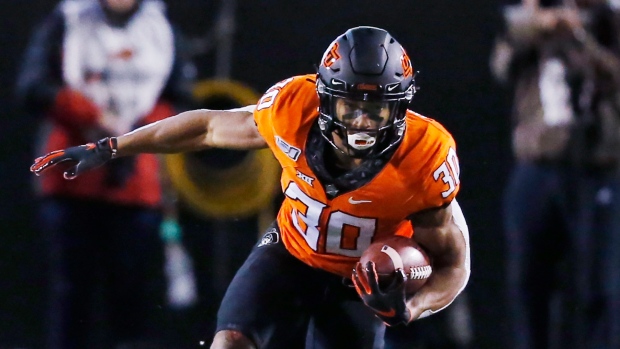
As we count down to 2020, TSN.ca looks back over some of the most interesting stories of 2019. Not necessarily the best of the year, per se, but memorable games, moments and events that are worthy of reflection.
On Monday, it's 2019 in the NCAA.
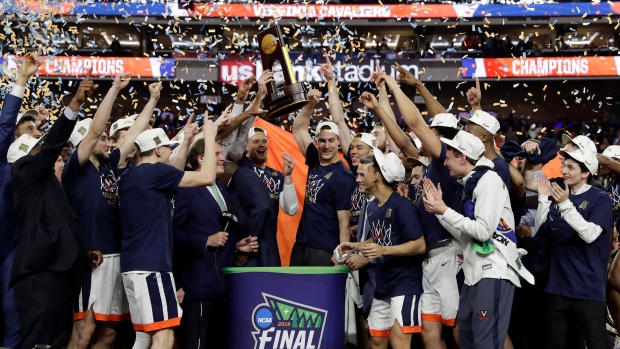
Virginia basketball finds redemption
The University of Virginia men’s basketball team had arguably the greatest redemption story of the year.
In 2018, the school earned the dubious distinction of becoming the first No. 1 seed in men's college basketball history to lose to a No. 16 seed in the NCAA tournament. Prior to Virginia’s loss, No. 1 seeds were 135-0 all-time against No. 16 seeds. The Cavaliers didn’t suffer a small defeat, though, they were throttled by the much smaller University of Maryland, Baltimore County (UMBC) by 20 points.
Virginia quickly put its embarrassing loss behind it, however, bouncing back in 2019 to once again earn a No. 1 seed for the NCAA tournament. This time around, the Cavaliers couldn’t be stopped.
In recent years, head coach Tony Bennett’s program had been successful, earning trips to the Sweet 16 and even the Elite Eight rounds, but his 2019 squad achieved success the likes of which Virginia’s program had never seen before. It started with the school reaching its first Final Four since 1984, and culminated with the Hoos reaching the National Championship Game for the first time ever and taking down Texas Tech to be crowned collegiate champions.
As a show of just how talented of a team they were, three Virginia players were drafted in last year’s NBA Draft: De'Andre Hunter, fourth overall; Ty Jerome, 24th overall; Kyle Guy, 55th overall. - Tristan Garnett

Chuba runs wilds
Many Canadian college football fans didn’t know the name Chuba Hubbard heading into this NCAA season.
And why would they?
After he was redshirted in his freshman season, the running back from Edmonton ran for 740 yards and seven touchdowns in 2018, but didn’t make national headlines as a member of the 6-7 Oklahoma State Cowboys.
However, everything clicked for the 20-year-old track star in his sophomore campaign.
The speedy sprinter ran for a NCAA-leading 1,936 yards with an incredible 21 touchdowns, leading the Cowboys to an 8-4 record and a third-place finish in the very competitive Big 12 conference. During one stretch of excellence, Hubbard ran for at least 100 yards in 10 straight games.
Hubbard was awarded for his breakout season by being named the Big 12 offensive player of year and even got a sniff at a Heisman Trophy nomination. If not for tennis superstar Bianca Andreescu, Hubbard had a chance of winning the Lou Marsh Trophy as Canada’s top athlete for 2019.
So, most will agree this was one of the best seasons a Canadian put together in NCAA history. But what does the future hold for the Sherwood Park, Alta., native? How good can he be?
If Hubbard decides to declare for the NFL Draft, some say he has a decent shot at going in the first round. Only two Canadians in skilled positions (quarterback, wide receiver, tight end, running back) have been selected in the first round of the NFL Draft: running back Tim Biakabutuka, eighth overall to the Carolina Panthers in 1996 and wide receiver N'Keal Harry, 32nd overall to the New England Patriots in 2019. Biakabutuka rushed for 611 yards and 14 touchdowns over his six years in the NFL while Harry has appeared in only four games this season with the Pats.
Calgary native Nate Burleson is probably the best Canadian skilled positioned player ever, catching 457 passes for 5,630 yards and 39 touchdowns over 135 games with the Minnesota Vikings, Seattle Seahawks and Detroit Lions.
When it comes to Canadians in the NFL, it usually means players on the offensive line or defence. Scoring epic touchdowns and being featured on the cover of Sports Illustrated is usually reserved for Americans.
If the 6-foot-1, 207 pound Hubbard can find a way to transition his game to the NFL-level, he’ll become Canada’s first true football star. - Ryan Horne
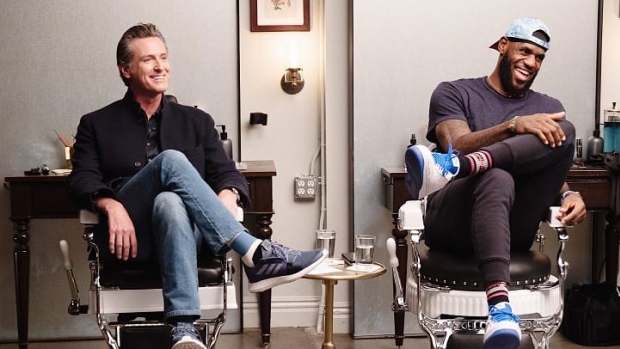
'Fair Pay to Play Act' comes to California
After what has seemed like forever, NCAA athletes are finally on the verge of getting paid. No, they won’t be getting fat salaries from the very schools that many people believe take advantage of their athletic prowess in order to profit themselves, but rather, they will be paid by businesses that want to use the athletes’ name, image or likeness. Essentially, in the near future NCAA athletes will be able to sign endorsement deals.
So, how did we get to this point? A law signed in California on Sept. 30 known as the Fair Pay To Play Act kick started the movement for NCAA athletes to be permitted to sign endorsement deals. The bill is scheduled take effect in 2023 and will allow collegiate athletes in the state of California to sign endorsement deals.
Both athletes and the general public alike deserve credit for helping to get the law passed. NBA superstar LeBron James, in particular though, really pushed the movement this year through his various platforms. In fact, the Fair Pay To Play Act was signed by California Gov. Gavin Newsom on James' television show "The Shop”.
Shortly after the passing of the Fair Pay to Play Act, other states begun to discuss following suit. Initially, the NCAA objected to the bill, stating that California schools would be prohibited from participating in NCAA events. However, whether it was because of the potential for the NCAA to be hit with subsequent lawsuits or because of other reasons, the collegiate governing body quickly changed its stance and has said it will allow athletes from member schools to sign endorsement deals. The NCAA has said that it wants to have rules in place for all three of its divisions by January of 2021.
With college athletes gaining the ability to make money off endorsements, It’s unclear if the extremely popular collegiate video games that were available for two decades will return again, such as those created by EA Sports. Instead, expect to see collegiate stars start popping up in commercials, on billboards and at memorabilia signings one day soon. - Tristan Garnett
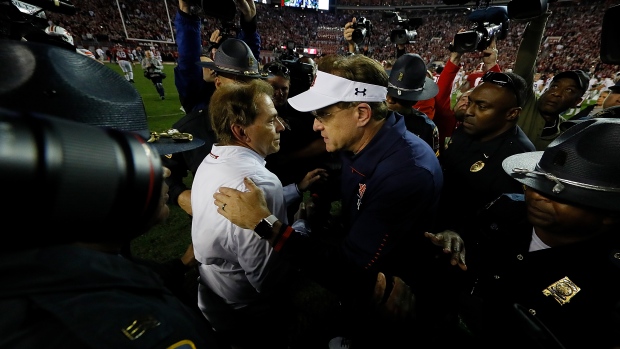
Gus gets the best of Saban
It’s not unfair to say that the Auburn Tigers football program operates in the shadow of its state rival, the Alabama Crimson Tide. The Bama football program is an absolute behemoth and has become the standard for excellence in the FCS. In recent history under the stewardship of Nick Saban, the Tide have dominated the SEC to the tune of 11 conference titles, eight SEC titles and five national championships over 13 seasons.
Needless to say when Gus Malzahn’s Tigers can get one over on the Tide in the Iron Bowl, it’s a momentous occasion for the War Eagle crowd. The 2019 edition on November 30 offered one such occurrence.
Bama entered the Iron Bowl, the final game of the regular season, with one loss, having fallen to No. 1 LSU two weeks prior. The road to the College Football Playoff remained relatively straightforward for Saban and the Tide, though. With the future SEC champion, Ohio State and Clemson having almost assuredly locked up three of the four playoff spots, one remained open. Presuming that LSU would take care of Georgia in the SEC Championship (and they eventually would), a win for Bama in the Iron Bowl would put the Tide in very strong contention for that last spot and, given the team’s pedigree, the driver’s seat for it.
While Bama still had a national title in mind, the Tigers were playing for pride with losses to Florida, LSU and Georgia taking them out of any kind of title contention. And play with pride, they did.
With just over eight minutes left in the fourth, an 11-yard Shaun Shivers touchdown run would cap off an 11-play, 77-yard drive for the Tigers. Bo Nix then hit Shedrick Jackson for the two-point conversion to give Auburn a 48-45 lead. This would be the 10th and final lead change of the game, but Malzahn’s biggest move to preserve a victory was still to come.
As time ticked down in the fourth, it appeared that Mac Jones – in for the injured Tua Taigovaloa – and the Tide offence would have one final drive with a chance to win the game. With 1:06 left on the clock and the ball on the Tigers’ 26, Auburn was up against a fourth-and-4. Anticipating the upcoming punt, Saban sent out receiver Jaylen Waddle to return. But no punt was coming.
Though Auburn punter Arryn Siposs was on the field, he lined up at the X with Nix in shotgun. Alabama didn’t know what to make of the formation and by the time Saban figured out what was happening, it was too late. As the punt-return team hurried off the field and the defence ran back on, Waddle stayed where he was. The Crimson Tide had 12 men on the field and Malzahn’s feint resulted in a five-yard penalty, giving the Tigers a new set of downs and icing the game for Auburn.
"It worked out pretty good," Malzahn said of the play after the game.
Saban’s assessment wasn’t as favourable.
"I really feel it was a pretty unfair play at the end of the game," Saban said. "They substituted the punter as a wide receiver so we put the punt team in, and when the quarterback was still in there we tried to put the defense back in, I thought they should’ve given us a little more time to substitute and get Waddle out as a returner (but) we get called for 12 guys on the field. That was very disappointing.”
Even more disappointing for Saban? Thanks to the loss, the Crimson Tide will miss out on the College Football Playoff for only the second time in its short six-year history. - Mike Beauvais
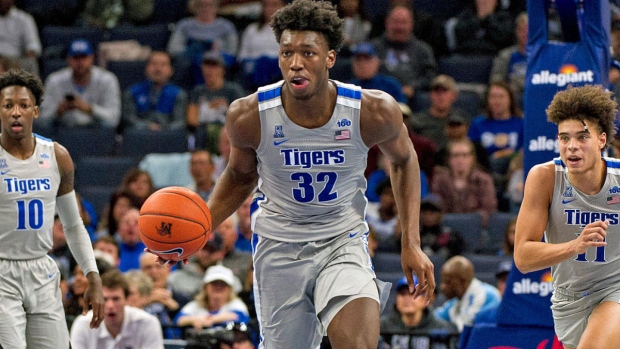
Wiseman leaves NCAA
James Wiseman’s quick stay in the NCAA
If you didn’t know James Wiseman’s name before the start of the 2019-20 NCAA basketball season, there’s a good chance you know who he is now.
A member of the Memphis Tigers, Wiseman played just three games in the NCAA before announcing on Dec. 19 that he had withdrawn from the university to focus on his pro career rather than sit out the rest of a 12-game NCAA suspension after his eligibility was called into question.
The freshman forward entered the season projected to be a lottery pick in the 2020 NBA draft, and hit the ground running with 28 points and 11 rebounds in Memphis’ first game of the season, a 97-64 win over South Carolina.
However, on Nov. 8. – just hours before the team’s next game – Wiseman was ruled ineligible by the NCAA for the role that head coach Penny Hardaway played in the 18-year-old’s move to Memphis.
In 2017, Hardaway helped Wiseman and his family move to the city, paying for $11,500 in moving expenses reportedly via a loan to Wiseman’s mother. Although Wiseman was declared eligible by the NCAA in May 2019, that ruling had changed.
Hardaway wasn’t coach of Memphis at the time, but the NCAA still ruled the payment wasn’t permitted. The NCAA, rather, counted him as a booster for donating $1 million to his alma mater in 2008, money that was used for the university's sports hall of fame.
Wiseman took legal action, filing an emergency restraining order and a Shelby County judge put a hold on the ruling pending further litigation. Wiseman took the court later that night, finishing the game with 17 points, nine rebounds and five blocks as the Tigers cruised to a 92-46 victory over Illinois- Chicago.
The 7-foot-1 Nashville product played in one more game before withdrawing his lawsuit, waiting to see if his appeal would work.
However, his 12-game suspension was upheld on Nov. 27 after an appeal hearing and he was ruled eligible to return on Jan. 12 2020.
The NCAA had also ruled that Wiseman needed to donate $11,500 to a charity to get back his eligibility.
In an Instagram post, Wiseman wrote, “This was not how I expected my freshman season to be, but I’m thankful for everyone who has supported my family and me throughout this process.”
“I feel blessed for the opportunity to be a Tiger and for having the honor to play with these special group of guys. I can’t wait to see what all they accomplish this season. The friends and fans of Tiger Nation will always hold a place in my heart.” -- Luke Bellus




